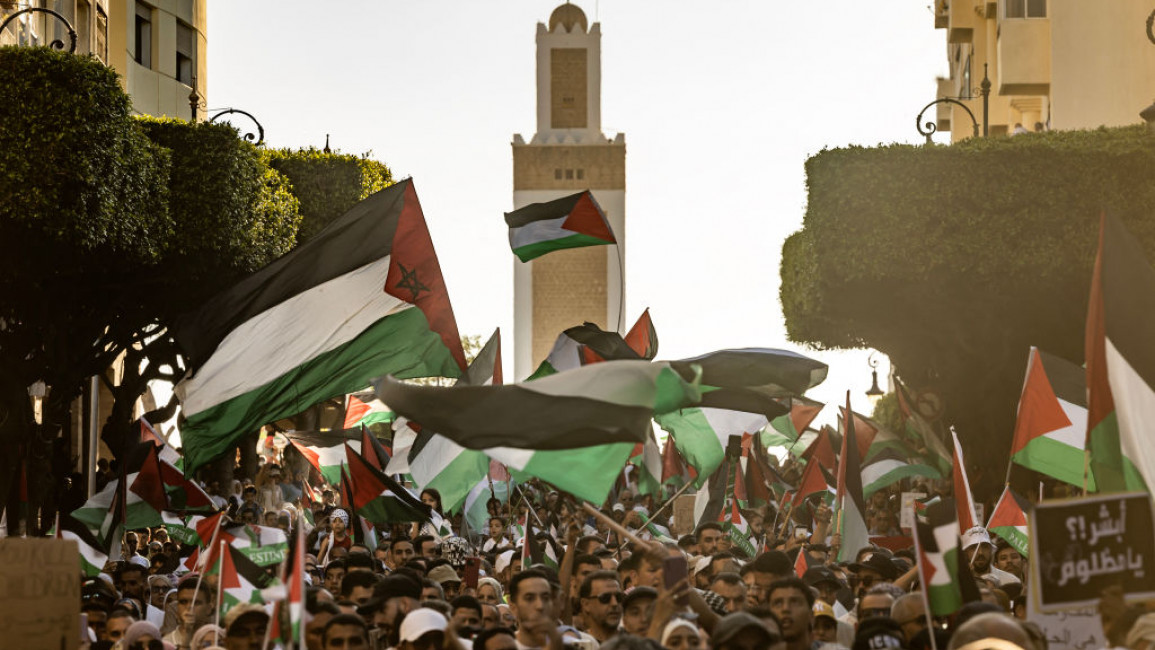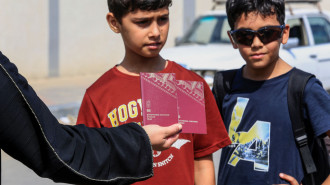Morocco's students rise up against 'academic normalisation' with Israel over genocide in Gaza
It has been almost a year since Israel's genocide on Gaza began, yet some universities in Morocco remain steadfast in maintaining ties with Israeli institutions.
This October, Moroccan student unions are poised to escalate their demonstrations as Tel Aviv's expands its war to Lebanon, killing more than 1,000 people and displacing a million in just two weeks.
The focus is squarely on Mohammed VI Polytechnic University (UM6P), which has established the most partnerships with Israeli universities.
In June, the UM6P administration informed students that its agreements with Israeli universities would remain intact. "There have been no updates since June", confirmed UM6P Students & Alumni for Palestine.
Since Morocco's 2020 normalisation agreement with Israel, UM6P has signed partnerships with eight Israeli universities, including the Hebrew University of Jerusalem, known for its collaboration with the Israel Defence Forces on military technology.
UM6P, a private non-profit research university, operates campuses in Ben-Guerir and Rabat, with a new location recently opened in Paris.
In 2022, it launched the first student exchange programme between Israel and Morocco in collaboration with Ben-Gurion University of the Negev. Although larger exchange programmes followed, they were temporarily suspended last October due to security concerns and to mitigate public backlash, according to the students' union.
"However, other forms of cooperation may still be ongoing," they noted.
The New Arab contacted the UM6P administration for comment, but no one was available to answer by the time of publication.
On 7 October, marking one year since the onset of genocide in Gaza, UM6P students will hold a campus-wide mobilisation day, donning keffiyehs and stickers in support of Palestine. A similar event was planned for the graduation ceremony in July, but the administration cancelled it just 48 hours in advance.
The union says it will also join the nationwide protest on 6 October.
Local pro-Palestine groups are organising several demonstrations across Morocco on Sunday, 6 October, with the largest planned for Rabat, featuring prominent figures. Even former Prime Minister Abdelillah Benkirane, the head of the party that signed the normalisation, is set to make an appearance.
Newly formed pro-Palestine unions from Rabat's International University and Fez's Euro-Mediterranean University will also join the demonstration in Rabat under the slogan: "There's no place for genocide committers in our universities."
This will mark the first time Moroccan student unions take to the streets to protest Israeli ties since the normalisation agreement four years ago.
As universities retreat, Morocco still firm on ties with Israel
To date, universities have shown little interest in openly discussing 'academic normalisation' or negotiating with unions, according to student groups, who have tried to address these concerns internally before resorting to public demonstrations.
Meanwhile, some universities have opted to issue press statements to "clear their reputations."
On 21 September, Abdelmalek Essaadi University in Tetouan published a statement denying it accepts Israeli students after social media users pointed out that the university’s website listed Israeli students as an option for master's programme registration.
In May, 600 professors and staff at Abdelmalek Essaadi University signed a petition to cancel the partnership agreement with the Israeli University of Haifa.
A source from the university denied any ongoing exchange programmes or partnerships with Israeli institutions, stating, "No, we have no contact with any Israeli institution now," and requested anonymity.
The path of academic normalisation in Morocco began in 2022 when the Moroccan and Israeli ministries of higher education signed the first cooperation agreement between universities and research centres.
Although some Moroccan universities are distancing themselves from their ties to Israel, Rabat doesn't shy away from its relationship with Tel Aviv, despite social and political opposition. It confirmed in March that it maintains relations with Israel, citing the normalisation's supposed benefits for the Palestinian cause.




 Follow the Middle East's top stories in English at The New Arab on Google News
Follow the Middle East's top stories in English at The New Arab on Google News
![People gathered around the rubble of destroyed houses to search for survivors [Getty]](/sites/default/files/styles/image_330x185/public/2024-11/GettyImages-2184733820.jpg?h=199d8c1f&itok=NiM1LO2f)

